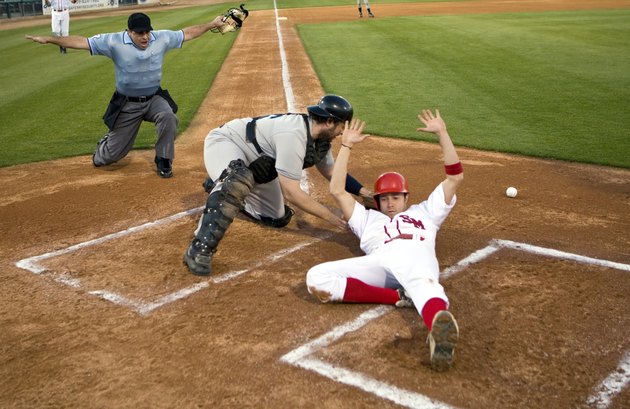Due to a quirk in the way standings are calculated throughout a baseball season, the lead one team has over another is often described in half-games. For example, one team will have a half-game lead over another. The quirk is simple to understand in the context of how standings are compiled.

Sponsored Links
Standings
The phrase "games back" describes the distance between two teams. To calculate how many games back one team is from the division leader, take the difference between the wins and losses of both teams. For example, if Team A has five wins and two losses, while Team B has two wins and five losses, Team B is three games behind Team A. It's a simple calculation, and all things being equal, the final result is rendered in full games when the season is complete.
Sponsored Links
Extra Game
A half game in the standings is basically one team's "share" of the difference between two teams. For example, Team A is scheduled for a day game, while Team B is scheduled for a game at night, and both teams have the same record. If Team A wins its game, it moves ahead of Team B by half a game because it has one more win than Team B at that point, but the same number of losses.
Schedule
Half-game advantages may show up in the standings whenever games remain to be played. For example, in 2013, baseball's lone opening game was played on a Sunday night. Its winner, Houston, was listed in the Monday standings as being a half-game ahead of its division opponents though none of them had played. It's rare throughout the year that all teams will have played the same amount of games, so some team may sport a half-game lead clear up until the last game of the year. Some sports, such as football, don't see half-games persist for very long due to a more uniform schedule.
Exceptions
Generally, half-game differences in the standings are meaningless. Eventually, all teams will play the same number of games, except in rare circumstances. For example, if a game got rained out between teams out of playoff contention, and its result has no impact on the standings, the league could decide not to play it all. Those two teams may have a half-game in their final standings. You'll never see this at the top of the final standings, though, since the league will always play a game that could decide the winner.
REFERENCES & RESOURCES Baseball Prospectus: Games Back MLB: Official Rules - Starting and Ending a Game Baseball for the Utterly Confused; Ed Randall